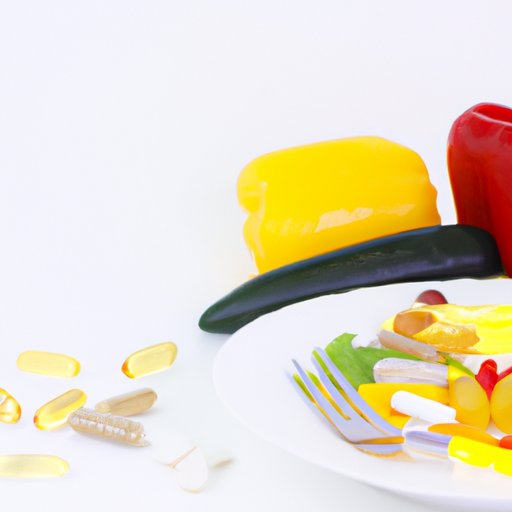Introduction
Hypothyroidism is a condition where the thyroid gland does not produce enough hormones to regulate the body’s metabolism. This can lead to a variety of symptoms including fatigue, weight gain, depression, dry skin, constipation, and muscle aches. Diet plays an important role in managing hypothyroidism and ensuring that the body has the necessary nutrients to support healthy thyroid function.
Nutritional deficiencies are common in those with hypothyroidism, and it is important to identify these deficiencies and supplement appropriately. Eating a balanced diet rich in whole foods is also essential for managing hypothyroidism, as well as increasing your intake of iodine-rich foods and avoiding certain foods that can interfere with thyroid function.

Identify Nutritional Deficiencies and Supplement Appropriately
The first step in managing hypothyroidism is to identify any nutritional deficiencies. Common deficiencies include vitamins A, B12, C, D, E, and K; minerals such as iron, magnesium, and zinc; and other nutrients like omega-3 fatty acids and amino acids. These deficiencies can be identified by a blood test and then addressed through supplementation.
When choosing supplements, it is best to look for natural sources such as herbs, minerals, and vitamins. Supplements should also be taken under the guidance of a healthcare professional. Many supplements are available over the counter, but some may require a prescription.

Eat a Balanced Diet Rich in Whole Foods
Eating a balanced diet is essential for managing hypothyroidism. This means consuming a variety of nutrient-dense foods such as fruits, vegetables, whole grains, legumes, nuts, and seeds. Eating a variety of whole foods provides the body with the necessary vitamins, minerals, and other nutrients it needs to support healthy thyroid function.
In addition to providing essential nutrients, eating a balanced diet can help reduce inflammation, improve digestion, and boost energy. It can also help reduce cravings for unhealthy processed and sugary foods.
Increase Your Intake of Iodine-Rich Foods
Iodine is an essential mineral for thyroid health. It helps the thyroid produce hormones that regulate metabolism. Therefore, it is important to include iodine-rich foods in your diet. Good sources of iodine include sea vegetables, iodized salt, dairy products, seafood, and eggs.
It is important to note that too much iodine can be harmful, so it is best to consult with your healthcare provider before increasing your intake of iodine-rich foods. Additionally, it is important to monitor your iodine levels regularly to ensure they remain within a healthy range.
Avoid Certain Foods That Can Interfere with Thyroid Function
Certain foods can interfere with the body’s ability to absorb and utilize thyroid hormones. These include soy, cruciferous vegetables (such as broccoli, cauliflower, and Brussels sprouts), and gluten. If you have hypothyroidism, it is best to avoid or limit your consumption of these foods.
Instead, focus on eating more anti-inflammatory foods such as leafy greens, nuts, seeds, and healthy fats. Additionally, replacing processed and sugary foods with whole foods can help support healthy thyroid function.

Make Sure to Get Enough Selenium in Your Diet
Selenium is another essential mineral for thyroid health. It helps the body convert inactive thyroid hormone (T4) into active thyroid hormone (T3). Good sources of selenium include Brazil nuts, tuna, oysters, and beef.
It is important to note that too much selenium can be harmful, so it is best to consult with your healthcare provider before increasing your intake of selenium-rich foods. Additionally, it is important to monitor your selenium levels regularly to ensure they remain within a healthy range.
Conclusion
Managing hypothyroidism diet requires identifying nutritional deficiencies and eating a balanced diet rich in whole foods. To ensure optimal health, include plenty of iodine-rich foods and make sure to get enough selenium. Additionally, avoid certain foods that can interfere with thyroid function and replace them with healthier alternatives. With the right diet and lifestyle changes, you can manage your hypothyroidism and enjoy improved overall health.
(Note: Is this article not meeting your expectations? Do you have knowledge or insights to share? Unlock new opportunities and expand your reach by joining our authors team. Click Registration to join us and share your expertise with our readers.)
